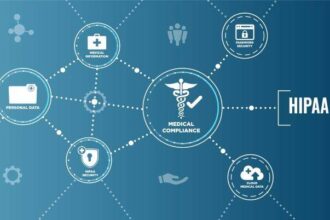Data analytics has created new opportunities for employers and workers around the world. However, a growing emphasis on data has also created a slew of challenges as well.
One of the biggest issues in healthcare is patient privacy. You can learn some insights from the study Patient Privacy in the Era of Big Data.
Allowing employees to work remotely helps them set their own schedules and work from home. Though some assume that this isn’t possible in the health care industry due to HIPAA regulations, it is possible. Established in 1996, HIPAA ensures that the confidential information of patients remains private. This is more important during the era of big data, since patient information is more vulnerable in a digital format.
HIPPA prevents health care professionals from talking about their patients or sharing their records with those outside of the industry. As you hire new employees and allow staff to work remotely, you need to know how to stay compliant with HIPAA guidelines, especially with a large data infrastructure.
Use Virtual Private Networks
Big data has created a new range of tools meant to make online privacy more feasible. VPNs are some of the most widely used data protection tools. They can easily handle hundreds of gigabytes of data.
A server cluster refers to a group of servers that share information and data. When you allow health care employees to work remotely, it’s helpful to use a virtual private network or VPN. This allows them to connect their computers at home to the server in the office or another location and share data across the network. A VPN is different from an open network because it blocks outsiders from accessing it without permission.
Using a VPN blocks all other computers and systems from accessing the shared network. This is important if you are trying to protect patient data.
Monitor Computer Usage
Data analytics has created new risks with digital security. However, analytics can also create new opportunities to protect digital data in other ways. You can use data mining tools to monitor the ways that employees use resources more easily.
Some workers make the mistake of thinking that they can use one computer for all their online and offline activities. They might check in on Facebook and play a few games or download a new app to a computer that they also use for work. This can result in hackers accessing your system through viruses and malware attached to those apps and sites. The things that they do with their computers can allow hackers to get into your files and cause data breaches that lead to your patients losing their trust in you.
Install Security Protocols
There are a number of ways to utilize big data to improve digital security. Joe Oesterling, Chief Technology Officer at Liquid Web recommends that you, “configure protective firewalls that limit certain incoming connections and set the hard drives to encrypt their contents automatically.” He also suggests telling employees to change their network connections and add a new password. Without a firewall, there is nothing between a potential hacker and your system. You may want to bring in a new security team or assign workers to security tasks. This can involve using antivirus software that routinely scans all connected computers for viruses. Good software can also identify anyone connected to your server cluster who should not be there.
Cybersecurity Training
HIPAA violations can cost you $100 to $500,000 for each breach and issue that you have. You risk losing a maximum of $1.5 million every year for violations of the same type that affect multiple patients. That is why cybersecurity training is helpful. Before hiring a new remote worker or sending someone to work from home, provide the proper training. Employees need to understand what those violations can mean to your bottom line and how to prevent them. Training teaches workers that they should never access data with a different computer and that they cannot copy confidential data onto another computer or system. The key to following HIPAA guidelines and keeping your server cluster safe includes computer monitoring and working with a security team.
Make Patient Data Privacy a Priority
HIPAA regulations can be convoluted and tough to implement. They are even harder in the big data era where healthcare employees are working from home. Fortunately, there are steps that can be taken to ensure data privacy is better implemented.










